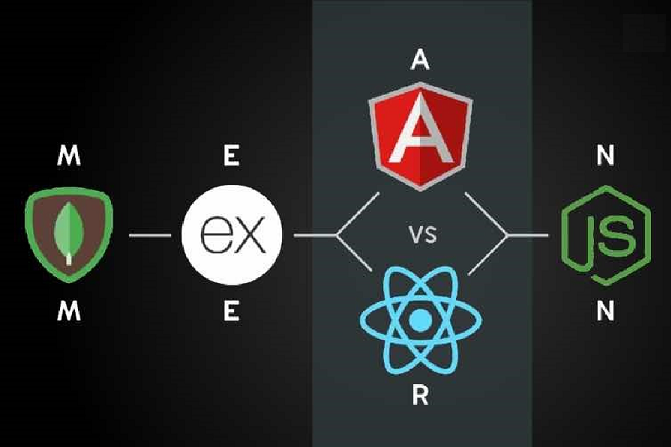Introduction
MERN Stack and the MEAN Stack are two popular sets of technologies used for building web applications. Both technology stacks have gained immense popularity in the web development community due to their versatility and efficiency.
In this section, we will explore the major differences between MERN Stack and MEAN Stack. Additionally, we will take a deeper look into their components, advantages, and use cases.
MERN Stack
The MERN stack is an acronym that stands for MongoDB, Express.js, React, and Node.js. It is a full-stack JavaScript framework widely used for web development. This implies that all the components of MERN stack use JavaScript as their primary programming language. The MERN Course helps you learn more about this technology.
Let us look at the breakdown of the components of MERN stack:
- MongoDB: It is a NoSQL database that stores data in the BSON (Binary JSON) format. It is popular for its high performance, scalability, and ability to handle unstructured data.
- js: It is a flexible Node.js web application framework with a set of robust features for building web and mobile applications. Moreover, Express.js simplifies the process of creating APIs and handling HTTP requests.
- React: It is a JavaScript library for building user interfaces. React is primarily used for creating single-page applications (SPAs) offering a smooth user experience. Moreover, its component-based architecture makes it easy to develop interactive UIs.
- js: This runtime environment allows you to run JavaScript on the server side. It offers a non-blocking I/O and event-driven architecture. Thus, Node.js is suitable for developing scalable applications.
Advantages Of The MERN Stack
JavaScript Throughout: MERN stack uses JavaScript for both server-side and client-side development. This allows for code reusability and a more consistent development experience.
- Rich User Interfaces: React’s component-based approach enables to develop interactive user interfaces.
- Scalability: MongoDB and Node.js are known for handling high levels of traffic and scalability. This makes MERN stack suitable for large-scale applications.
- Community Support: Additionally, all the components of the MERN stack have active and large developer communities. This implies that a wealth of resources, libraries, and plugins are available.
MEAN Stack
MEAN Stack is an acronym for MongoDB, Express.js, Angular, and Node.js. Like MERN Stack, the MEAN Stack also uses JavaScript as its primary programming language for front-end and back-end web development.
Here’s a breakdown of the components of the MEAN stack:
- MongoDB: MongoDB, is the NoSQL database used in both the MERN and MEAN stacks.
- js: Express.js is the same in both stacks, serving as the back-end framework for building web applications.
- Angular: Angular is a front-end framework for building dynamic and complex web applications. It provides features like dependency injection, two-way data binding, and a robust template system.
- js: Node.js, is used for server-side development in the MEAN stack.
Advantages Of The MEAN Stack
- Full-Stack JavaScript: MEAN stack allows developers to work with JavaScript throughout the entire application, which can simplify development.
- Strong Front-End Framework: Angular is a powerful front-end framework. It offers a structured way to create complex web applications with features like routing and form handling.
- Modular Development: Angular’s modular architecture encourages the creation of reusable components and modules. This makes it suitable for large projects.
- TypeScript Support: Angular is written in TypeScript, which adds static typing to JavaScript, enhancing code quality and maintainability.
Also, Read This: Bovine Gelatin Market Size
Key Differences Between MERN Stack And MEAN Stack
Front-End Framework
The most significant difference between the two stacks is the front-end framework. MERN uses React, while MEAN uses Angular. React is known for its flexibility and is often favoured for smaller projects and single-page applications. Angular provides a more structured approach suitable for larger, enterprise-level applications.
Let us look at the key differences between the MERN Stack and the MEAN Stack in detail.
Ease Of Learning
React is generally considered easier to learn for developers who are new to front-end development.
Angular has a steeper learning curve due to its comprehensive feature set.
Community And Ecosystem
Both stacks have active communities. However, React has a larger ecosystem with a wider range of libraries and resources available.
Use Cases
MERN may be preferred for projects where rapid development and flexibility are crucial, such as startups and smaller applications.
MEAN, with Angular’s robust structure, might be a better fit for complex enterprise applications with strict architectural requirements.
Conclusion
In conclusion, both MERN Stack and MEAN Stack are robust web development technologies. However, the choice between the MERN Stack and the MEAN Stack largely depends on the specific requirements of your project. Additionally, you need to identify your team’s familiarity with the technologies and the scalability of the application you are building. There are numerous IT companies in Noida that use both MERN Stack and MEAN Stack for web development. You can join the MERN Stack Certification course or choose a course on MEAN Stack. The choice must be solely based on your requirements and comfort. Both stacks have their strengths and can be used effectively in various scenarios, making them valuable tools in web development.



